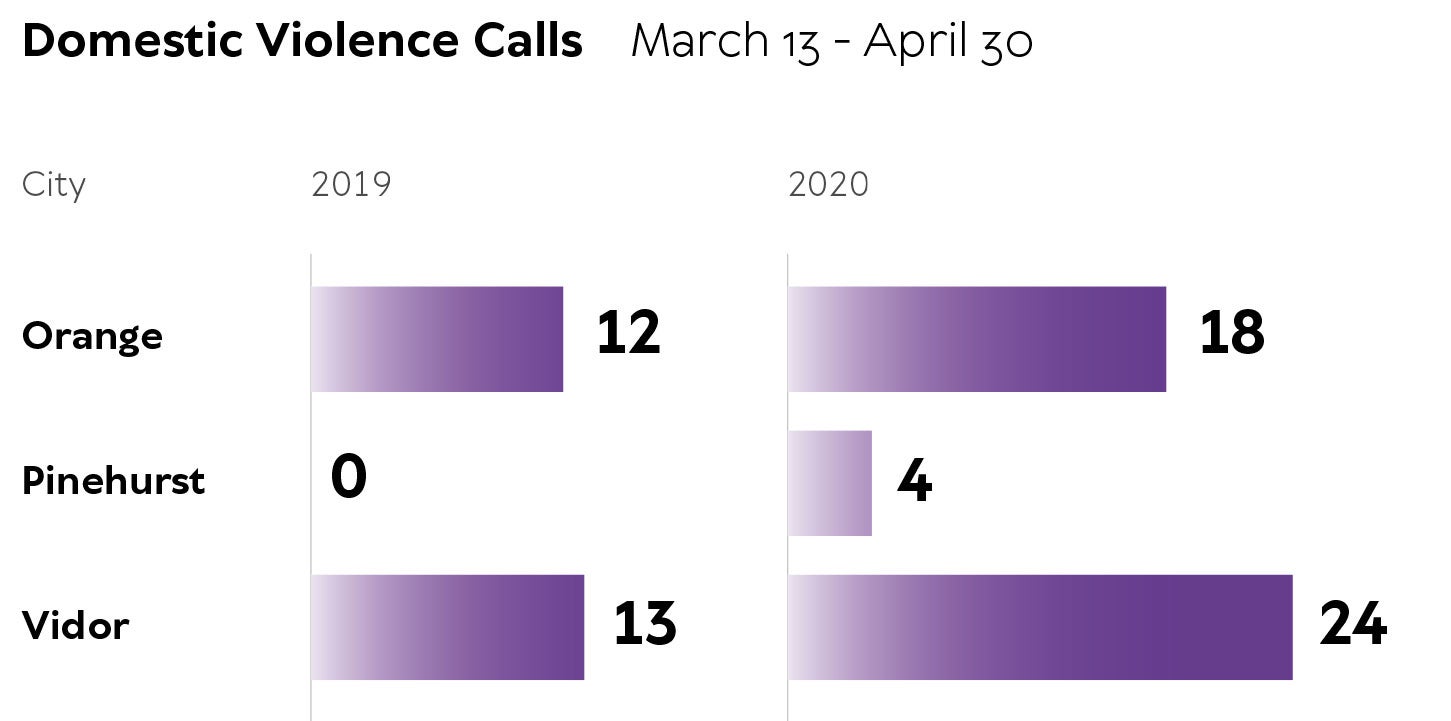Domestic Violence calls increase during COVID-19 quarantine
Published 12:29 am Saturday, May 16, 2020

- A victim of domestic violence has options and does not have to stay in the relationship.
|
Getting your Trinity Audio player ready...
|
Every nine seconds a woman is abused in the United States.
Domestic violence is the leading cause of injury to women – more than car accidents, muggings, and rapes combined, according to Family Services of Southeast Texas website.
Victims of intimate partner violence lost a total of 8.0 million days of paid work each year.
In 2018, it was estimated one in three women would experience an abusive relationship in their lifetime. Now, one in four will experience domestic violence during her lifetime.
While it appears, the numbers are going down, during the recent COVID quarantine, there was an increase in the number of calls local law enforcement agencies received between March 13 thru April 30, 2020 compared to last year at the same time.
Nearly 20 people per minute are physically abused by an intimate partner in the United States.
Approximately 4,000 women die each year to domestic violence.
Domestic violence is defined, by the United States Department of Justice, as a pattern of abusive behavior in any relationship that is used by one partner to gain or maintain power and control over another intimate partner. Domestic violence can be physical, sexual, emotional, economic, or psychological actions or threats of actions that influence another person. This includes any behaviors that intimidate, manipulate, humiliate, isolate, frighten, terrorize, coerce, threaten, blame, hurt, injure, or wound someone.
Family Services of Southeast Texas provides support services and assistance to domestic violence victims with a 24-hour hotline at 1-800-621-8882 and emergency transportation for domestic violence survivors to achieve personal safety.
Housing, at an undisclosed location for the safety of the residents, and counseling is available.
Comments such as, “I’m trying to find a shelter for me and my son. I have a case number but nowhere to go. My mother is the abuser and my son and my I are the ones being abused. Please help us get out of the situation we are in.”
Or, “I have a sister who is in a desperate situation. Her husband is a bad alcoholic and very abusive mentally and physically. She can’t leave or call any one because he is right next to her all the time so he can control what she does. Usually at night he passes out after drinking all day. He keeps his gun on the night stand right next to him. She has no place to go.”
Family Services of Southeast Texas has a Battering Intervention and Prevention program which focuses on educating the batterer on the nature of family violence, changing beliefs and attitudes that lead to violence.
The organization also has a shelter for women in need of such services. While group was founded in 1931, the primary purpose at the time was for food and other resources. Since the late 1970s and early 1980s, the organization has focused on domestic violence.
In the early days, the shelter was a house but has since become a facility with the ability to house 65-75 people.
A transitional unit is also available for women in need of staying longer.
However, one does not need to wait to be in a crisis situation with their significant other to reach out to Family Services of Southeast Texas.
Abusers can use:
- Coercion and threats
- Intimidation
- Emotional abuse
- Isolation
- Minimizing, denying, and blaming
- The children
- Male privilege, such as treating her like a servant, making all the big decisions, being the one to define male and female roles
- Economic abuse such as preventing or keeping her from keeping a job, or making her ask for money, taking her money
The organization will not turn anyone who is suffering from domestic violence and do not have to be in a crisis situation to receive services.
Stalking is also a form of domestic violence.
Stalking is a dangerous crime that can elicit feelings of fear, anxiety, depression, and isolation in its victims. However, victims of stalking are not helpless against their stalkers. The National Center for Victims of Crime advises people to take these steps if they feel they are victims of stalking.
- Call 9-1-1. People who suspect they are in immediate danger should not hesitate to call 9-1-1.
- Trust your instincts. It may be tempting to downplay the danger posed by a stalker, especially when victims have or have had personal relationships with their stalkers. However, the NCVC warns against downplaying the danger, noting that people who feel they are unsafe probably are. Threats should be taken seriously. Danger is generally higher when stalkers talk about suicide or murder and in situations when victims are trying to leave or end a relationship.
- Contact a crisis hotline. Crisis hotlines and domestic violence programs can help victims devise plans to safeguard themselves from stalkers. Such agencies also can provide insight regarding local laws, which vary depending on where victims live, and refer victims of stalking to other helpful services. Local programs or agencies can advise victims about contacting police and seeking court orders of protection.
- Develop a safety plan. Do not hesitate to develop a safety plan, which typically involves enlisting the help of trusted friends or relatives. Trusted loved ones can provide a respite from stalkers by offering a place to stay, and such friends and relatives also can accompany stalking victims to meetings with law enforcement authorities to provide support. Safety plans should include ways that victims will change their daily routines to make them less vulnerable to stalkers, as well as how they will respond if stalkers appear at their homes, schools, offices, or other places they frequent.
- Do not communicate with stalkers. Do not communicate with stalkers or respond to their attempts to contact you.
- Keep evidence that you’re being stalked. Do not delete emails, voicemails, text messages, letters, or other evidence that can prove you’re being stalked. In addition, take and save photos of anything stalkers damage, such as property, and any injuries they cause to you, a loved one or a pet.
Stalking is a serious crime, but victims do not have to suffer in silence. Learn more at www.victimsofcrime.org.
In 2016, 146 women in the state of Texas were killed by a male intimate partner in 55 counties.
In 2017, 134 women were killed in Texas in domestic violence cases.
In 2018, 174 women were killed in reported domestic violence incidents.
Beaumont Mayor Becky Ames commented on the number of domestic violence related calls in the city.
“Domestic violence related calls to law enforcement are up significantly due to COVID-19,” Ames said. “Financial stressors, as well as less opportunity to avoid the abuser, may be putting more people in tough situations. If you are in a domestic violence situation, please reach out to someone, do not suffer in silence. The police department can get you in touch with the social services that can help you escape.”
Governor Greg Abbott, on Thursday, announced the Texas Health and Human Services Commission (HHSC) has received more than $3 million in federal funding to provide shelter and services to survivors of family and domestic violence during the COVID-19 pandemic. This federal funding will support the 78 HHSC-funded local family violence centers that provide survivors with immediate shelter, supportive services, and access to community-based programs. These funds are made available through the Coronavirus Aid, Relief, and Economic Security (CARES) Act and will be administered through the U.S. Department of Health and Human Services’ Administration for Children and Families.
“As we respond to COVID-19, the Lone Star State remains committed to supporting survivors of domestic and family violence and keeping Texans safe,” said Governor Abbott. “I thank our federal partners at the U.S. Department of Health and Human Services for administering this funding to the state of Texas, and I am grateful to the organizations within HHSC’s Family Violence Program that continue to provide Texans with these crucial services.”
“The COVID-19 pandemic has presented challenging obstacles and uncertainty for many survivors of family violence across the state,” said Dee Budgewater, HHS deputy executive commissioner for Health, Developmental and Independence Services. “This grant is a significant investment that will connect vulnerable Texans to critical services, shelter, and move them toward a life free of violence.”
This new funding will provide direct support to 78 HHSC-funded local family violence centers working with survivors during the COVID-19 pandemic. The grant will also support a wide range of supportive services that are instrumental in helping survivors become self-sufficient. These services include temporary 24-hour shelter, counseling, mobile advocacy, telehealth, peer support, rental assistance, and relocation expenses. The funding also assists family violence centers to cover the costs of providing remote services to those in need.
The HHSC Family Violence Program promotes self-sufficiency, safety and long-term independence of adult and child victims of family violence and victims of teen dating violence. Through a network of service providers, the program provides emergency shelter and supportive services to victims and their children, educates the public and provides training and prevention support to various organizations across Texas. In 2019, 71,637 clients were served through by the Family Violence Program.
For more information, visit the Family Violence Program webpage. Texas residents can dial 2-1-1 to learn about HHSC programs and services.






